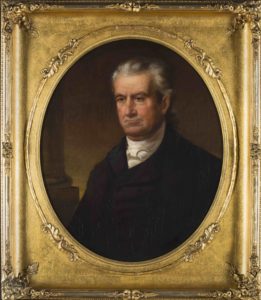
Rev. Lyman Beecher, artist unknown, commissioned in the 1850s by his daughter Harriet Beecher Stowe. Harriet Beecher Stowe Center
By Walter W. Woodward
(c) Connecticut Explored Inc. Fall 2019
Connecticut has long produced families of great ability whose accomplishments span generations. Perhaps no family stands out in this regard more than the Lyman Beecher family of Litchfield.
The son of a New Haven blacksmith, Lyman Beecher (1775 – 1863) became one of America’s most influential Second Great Awakening ministers while fathering 13 children who helped profoundly transform 19th-century America’s views on slavery, education, women’s rights, and religion. Beecher himself was a complex figure: though virulent in his anti-Catholicism, he was co-founder of the American Temperance Society and an outspoken anti-slavery voice who modeled the concept of passionate advocacy for his children, many of whom followed in his footsteps.
All seven of Lyman Beecher’s sons who survived to adulthood became ministers and anti-slavery advocates. Edward (1803 – 1895) organized the first anti-slavery society in Illinois. Charles (1815 – 1900) moved to Florida at war’s end to minister to newly freed slaves.
HenryWard Beecher (1813 – 1887) became the most famous of the Beecher ministers, eclipsing even his father. As pastor of Plymouth Church in Brooklyn,New York, he was a tireless advocate for abolition, women’s suffrage, the hotly contested Darwinian theory of evolution, and a now-dominant Christian theology that emphasized God’s love for humankind. His fame took yet more notoriety when he was charged with adultery by Theodore Tilton in 1875, a highly publicized trial that resulted in a hung jury—and divided the Beecher family.
The most famous of all the Beechers was Harriet (1811– 1896), author of Uncle Tom’s Cabin, the book Abraham Lincoln reputedly credited as “the book that started this Great War.” With her husband Calvin Stowe, Harriet had supported the Underground Railroad in her home in Cincinnati, and, after the passage of the Fugitive Slave Act in 1850, she felt compelled to write Uncle Tom’s Cabin, which in book form sold 300,000 copies its first year and strongly shaped Northern sentiment against Southern slavery. (See “The Most Famous American,” Summer 2011, and “’Must Read Book’ Is 160 Years Old,” Summer 2011.)
Harriet’s education had begun at the Hartford Female Seminary started by her sister Catherine (1800 – 1878)—assisted by sister Mary (1805–1900)—who became one of the 19th century’s leading education authorities. Her books about domestic economy shaped 19th-century middle-class homemaking standards for decades.
Isabella (1822– 1907) became a strong voice in the American women’s suffrage movement. She founded the Connecticut Women Suffrage Association and led it for 36 years, during which time she helped secure women the right to vote in local matters such as school and library spending, and succeeded in getting passed a law protecting Connecticut women’s property rights.
Much of the credit for the Beecher children’s influence goes to their mothers. Roxana Foote Beecher, mother to 9 of the 13, was, according to historian Joan D. Hedrick in Harriet Beecher Stowe, a Life (Oxford University Press, 1994) idealized by her family after her 1815 death from tuberculosis as “the symbol of all that was most perfect in womanhood.” Harriet Porter Beecher, whom Lyman married in 1817, was, like Roxana, a woman of “vigorous and cultivated intellect,” and she continued to provide the dual-gendered foundation for achievement that characterized the Lyman family. In a state with a long tradition of leading families, few if any have achieved more than the remarkable Beecher family of Litchfield.
Walter Woodward is the Connecticut state historian. Listen to his podcasts at Gratingthenutmeg.libsyn.com and visit TodayinCTHistory.com.

